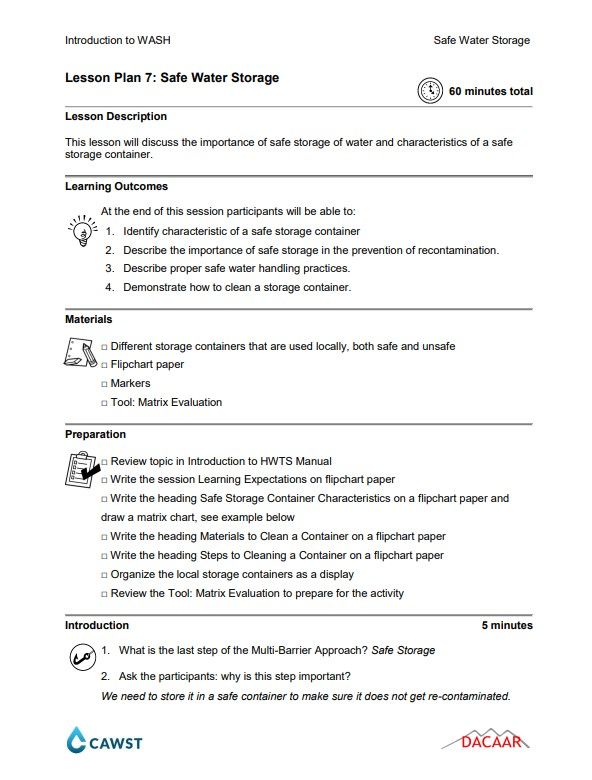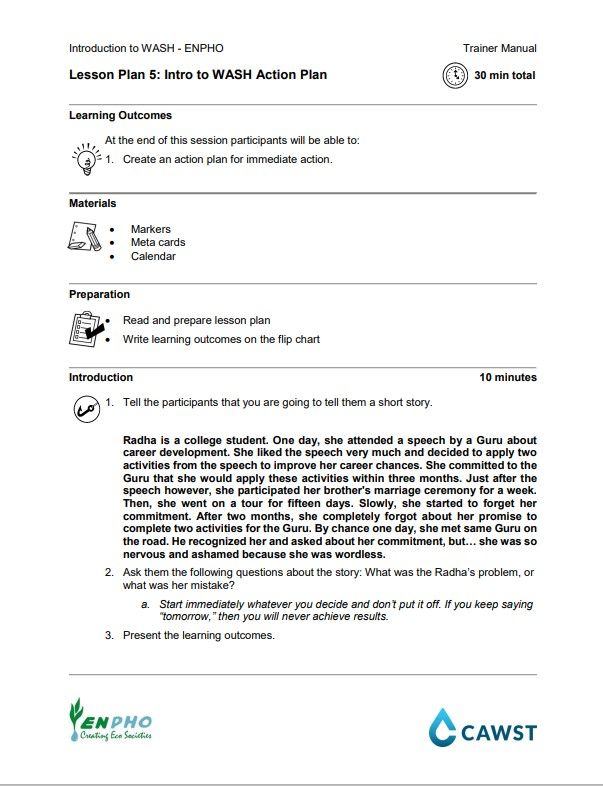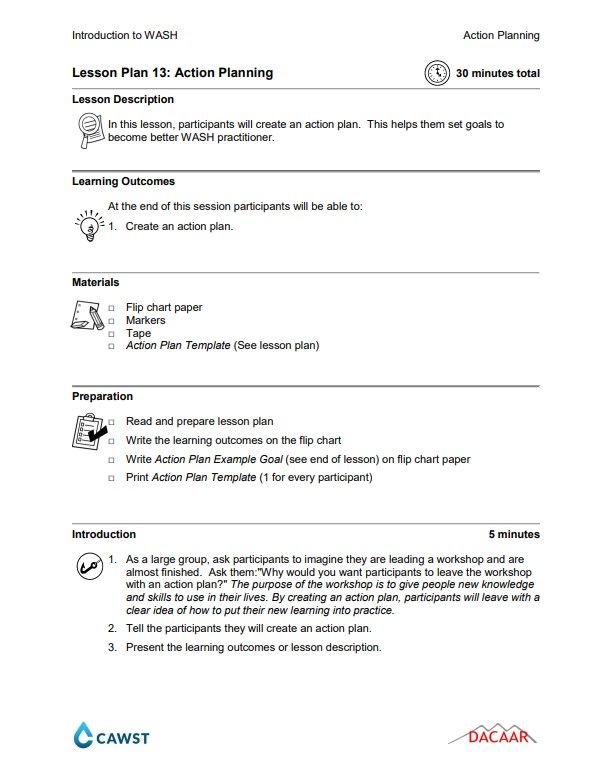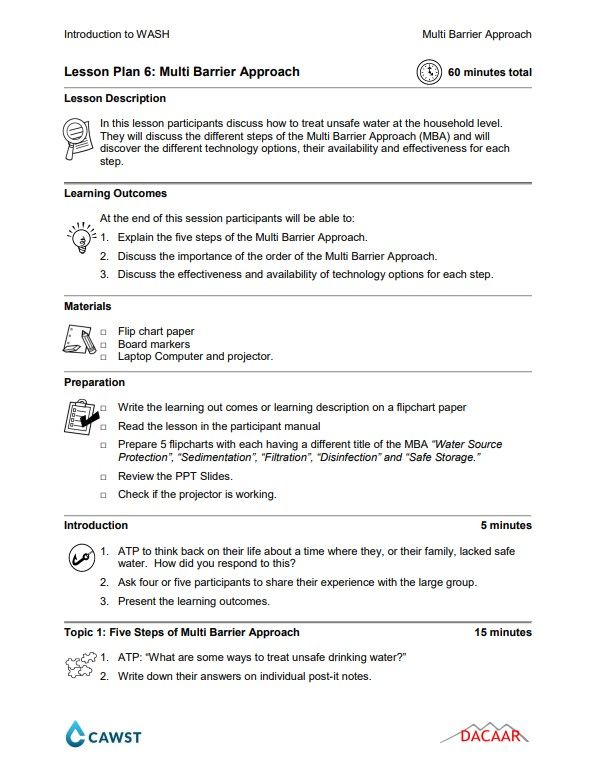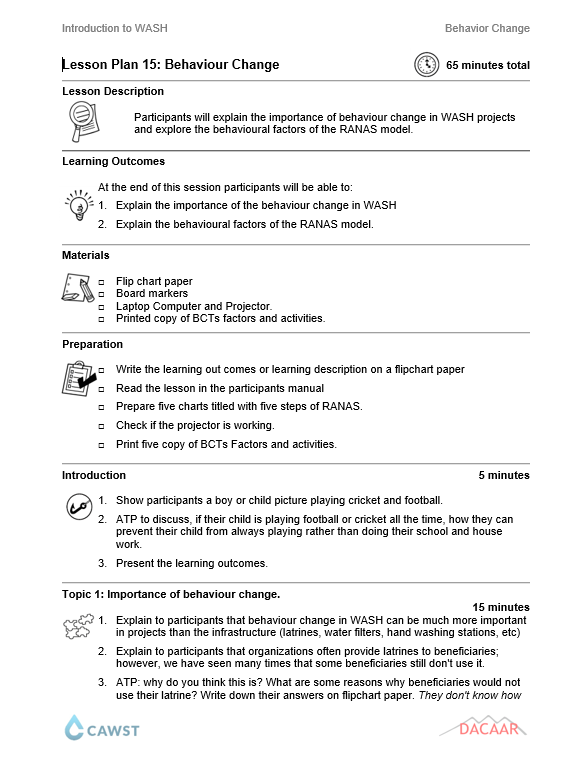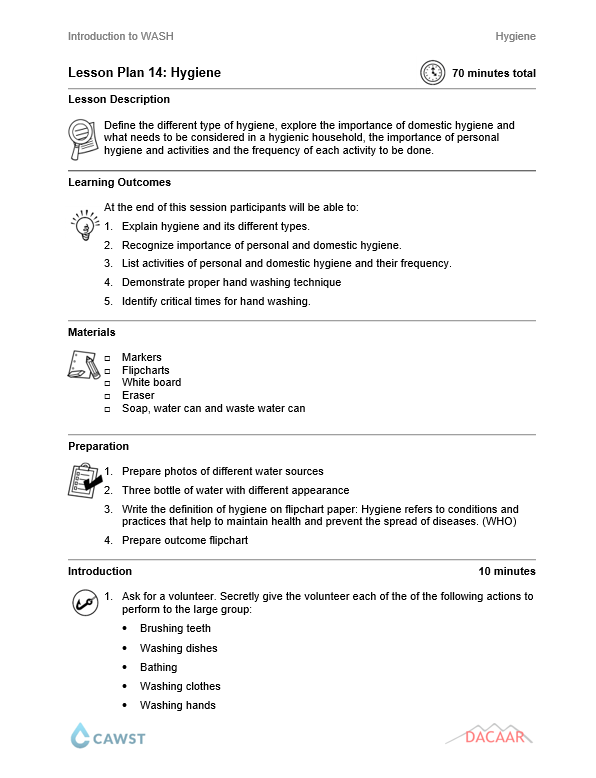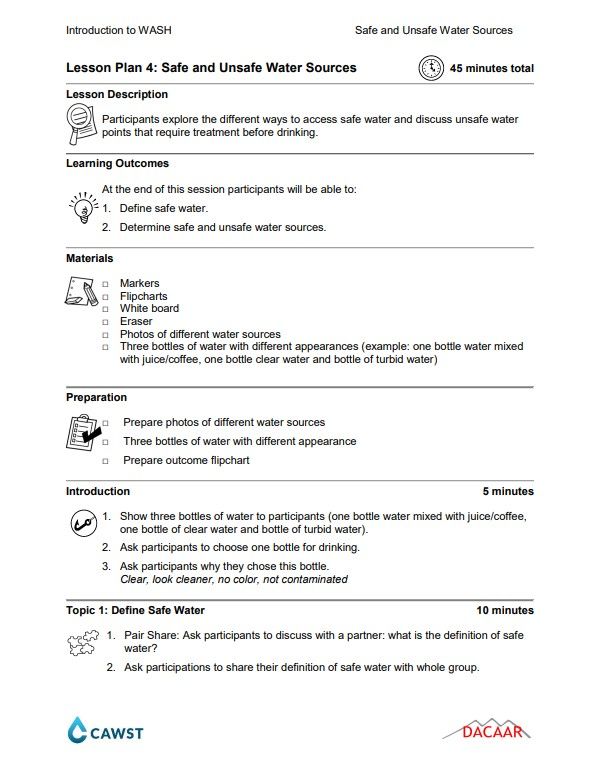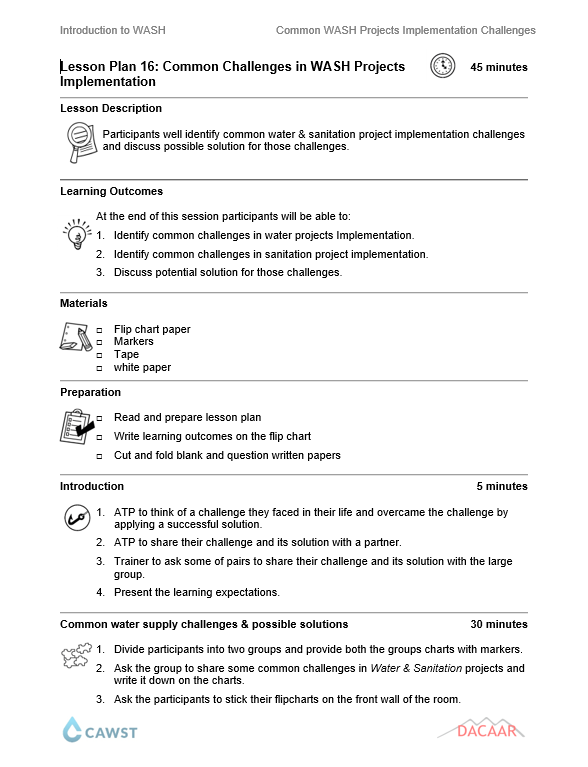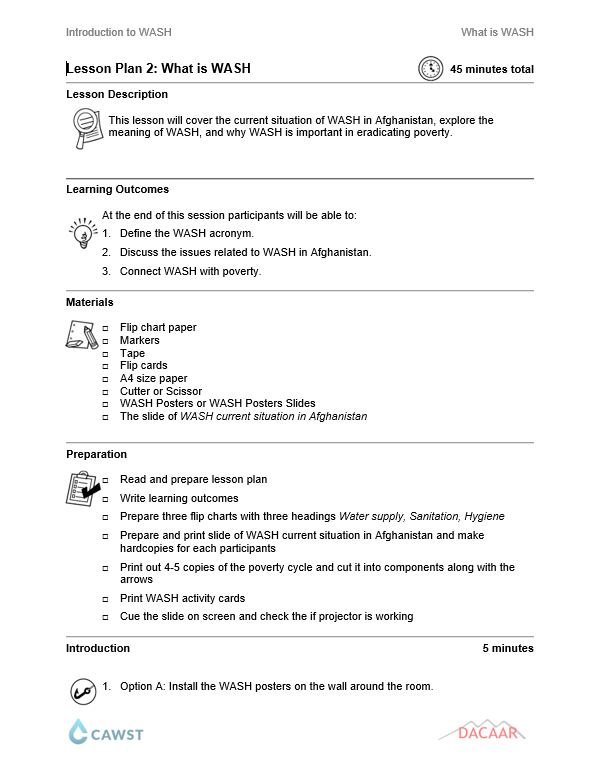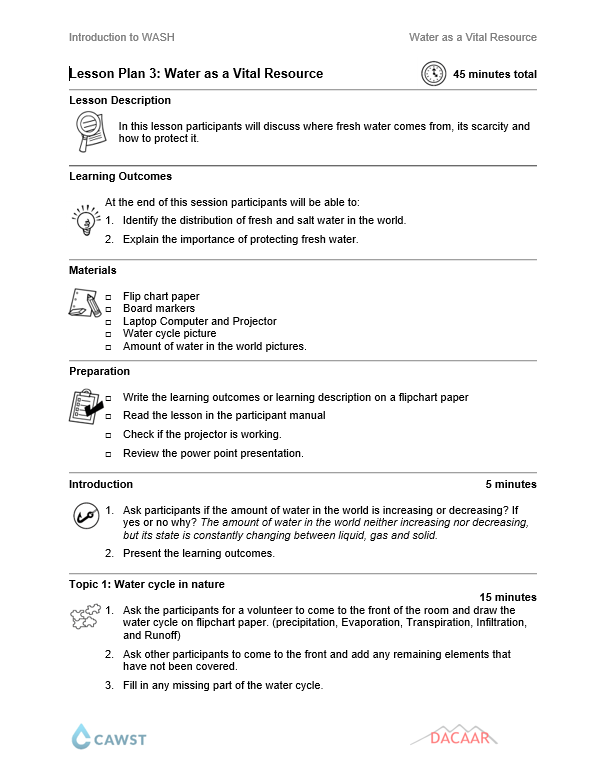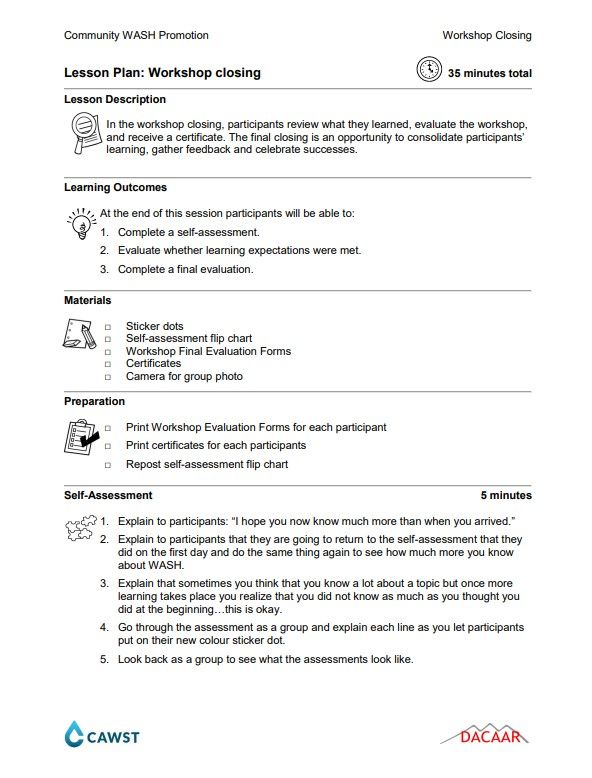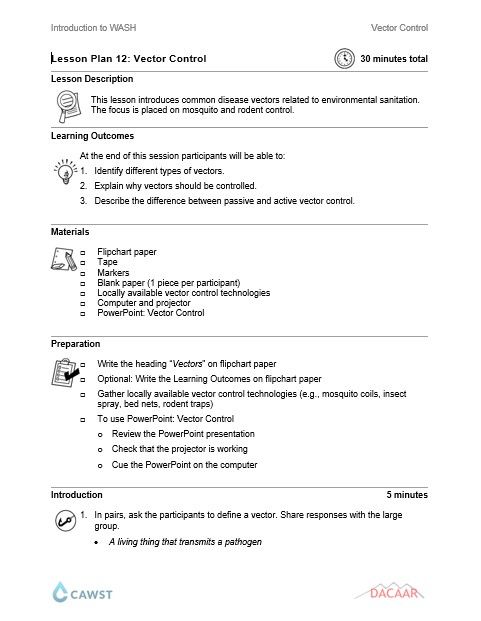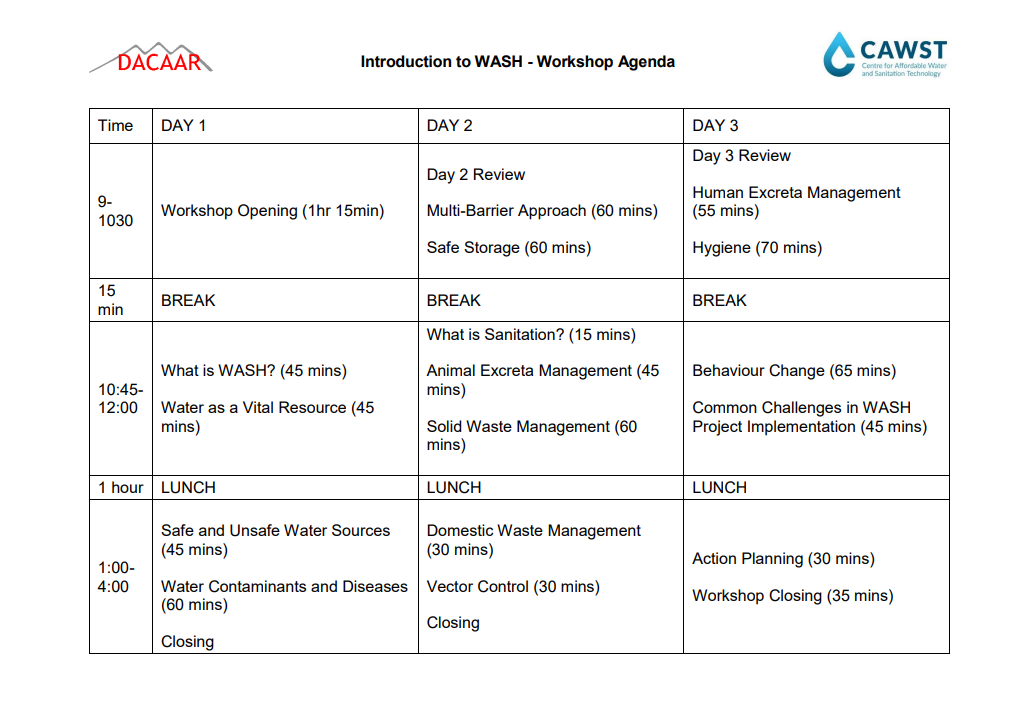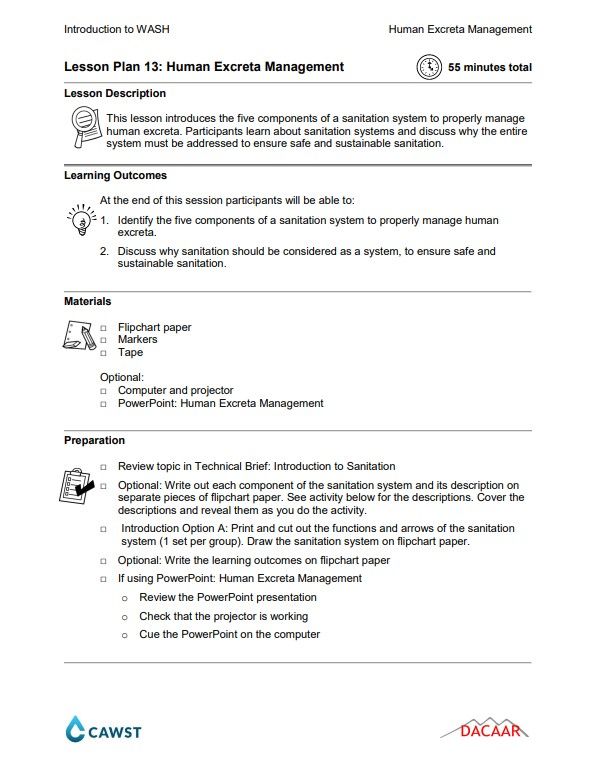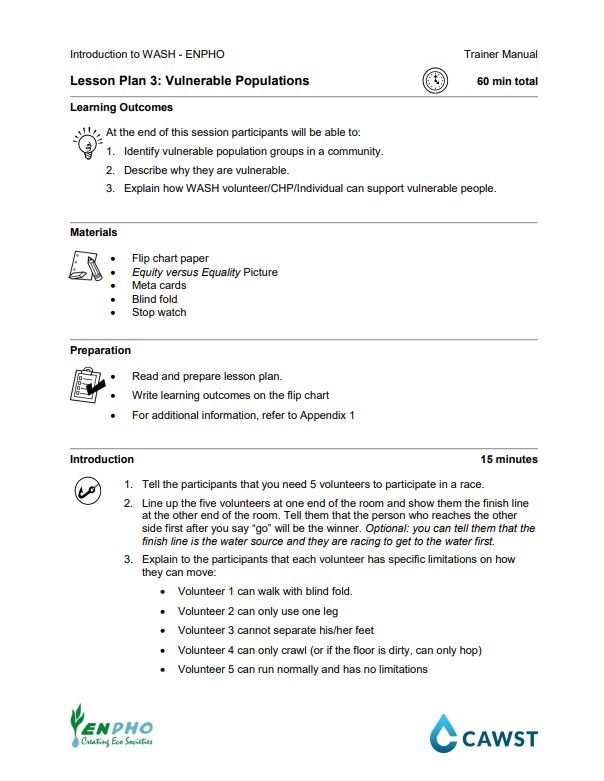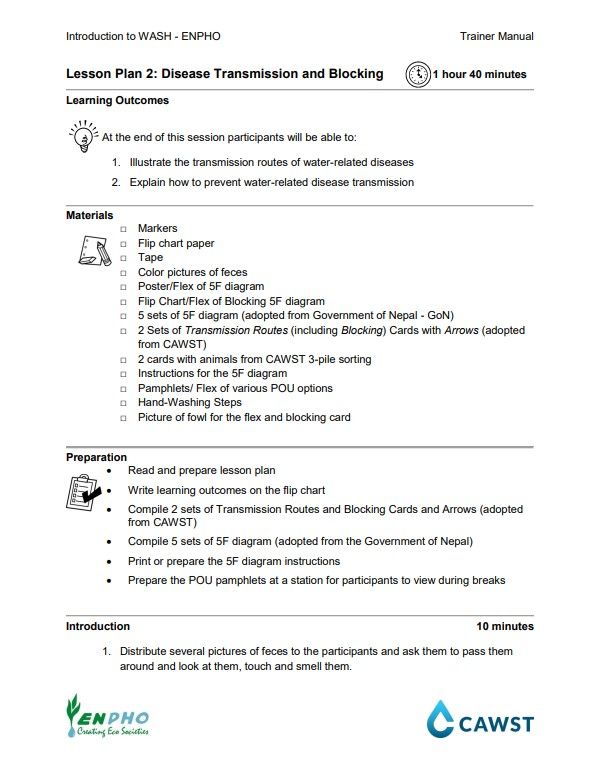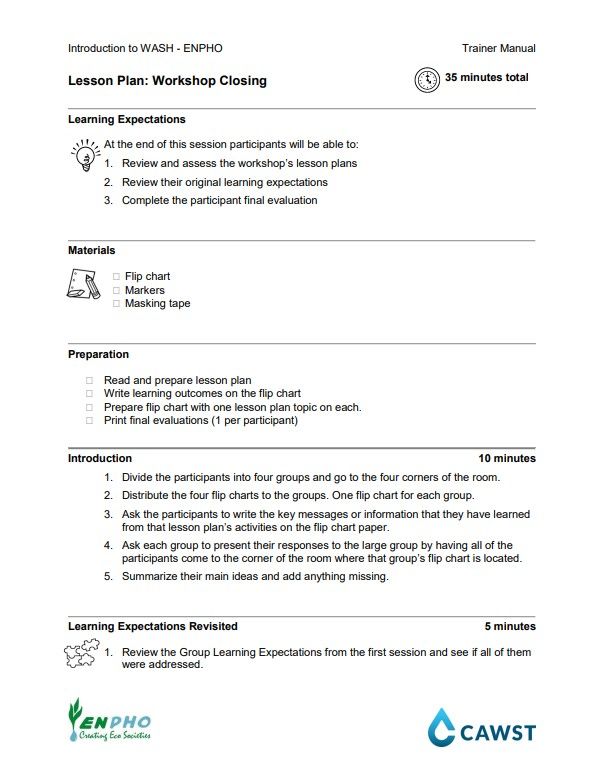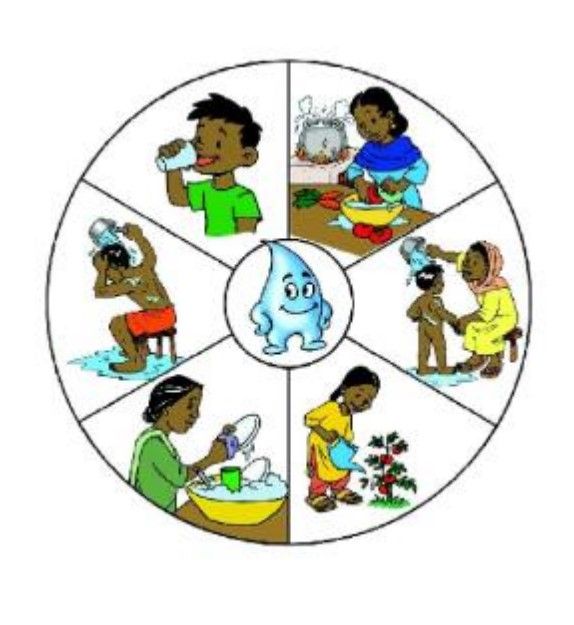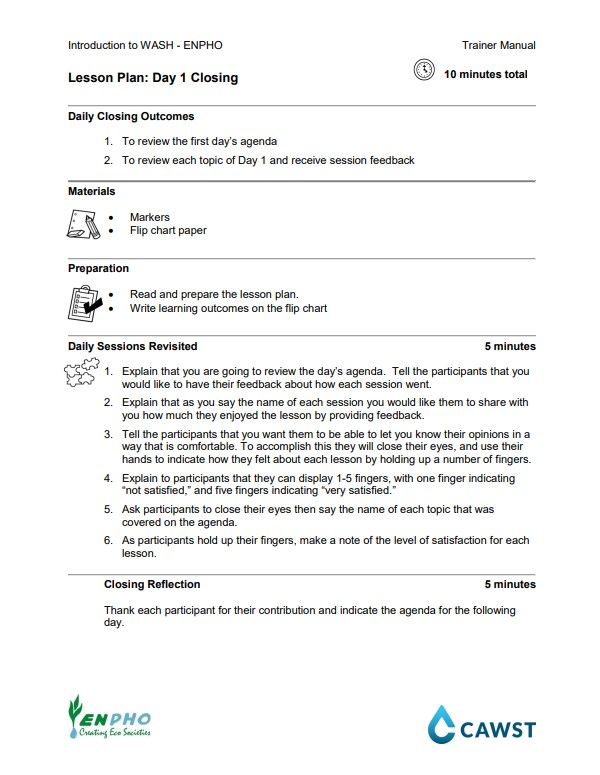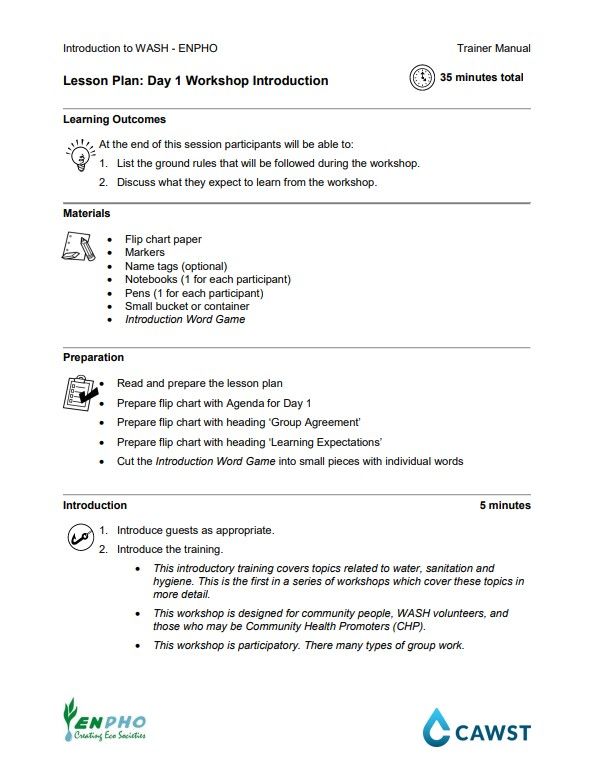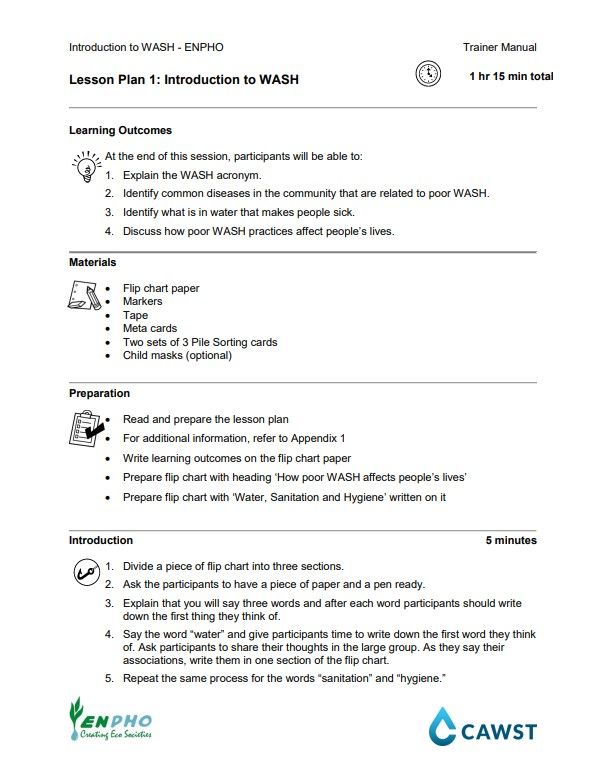Explore Introductory WASH
Community WASH Promotion Trainer Manual
This manual is for trainers who are interested in delivering training on Community WASH Promotion. It includes lesson plans, agendas, forms, and guidance on training delivery.
Languages
English
Spanish
French
Arabic
Hindi
WASH Behaviours
This hands-on card game was designed to use with youth in North America and Europe. It helps participants understand how local water, sanitation, and hygiene practices impact health and the environment.
Languages
English
Community WASH Promotion (CWP) Workshop
These workshop materials contain the resources for the Community WASH Promotion workshop. The role of the Community WASH Promoter is essential for the successful implementation of any household water treatment, sanitation, or hygiene (WASH) project. Through this workshop, participants will gain a clear understanding of the best practices for supporting community members in changing their behaviours of WASH practices with the aim of achieving improved community livelihoods.
Languages
English
Spanish
French
Arabic
Hindi
nt
Games and Activities
Use these activities and games to facilitate group understanding of water, sanitation, and hygiene.
Languages
French
English
Spanish
nt
Safe Water Storage - Lesson Plan (Intro to WASH)
This lesson will discuss the importance of safe storage of water and characteristics of a safe storage container.
Languages
English
Solid Waste Management - Lesson Plan (Intro to WASH)
This lesson introduces integrated solid waste management and the different stages where intervention activities can be effective, including collection, recycling, composting, burning and final disposal.
Languages
English
Domestic Wastewater Management - Lesson Plan (Intro to WASH)
This lesson explains the differences between blackwater, greywater, and overflow water. It focuses on the proper management of greywater and overflow water to protect public health and the environment. A demonstration is used to visually show what greywater looks like and how it is separated using a grease trap. For blackwater management, see Lesson Plan: Human Excreta Management.
Languages
English
Action Planning - Lesson Plan (Intro to WASH Nepal)
This lesson helps participants to create a personal action plan.
Languages
English
Action Planning - Lesson Plan (Intro to WASH)
In this lesson, participants will create an action plan. This helps them set goals to become better WASH practitioner.
Languages
English
Multi-Barrier Approach - Lesson Plan (Intro to WASH)
In this lesson participants discuss how to treat unsafe water at the household level. They will discuss the different steps of the Multi Barrier Approach (MBA) and will discover the different technology options, their availability and effectiveness for each step.
Languages
English
Water Contamination - Lesson Plan (Intro to WASH)
Participants explore the different ways that water can become contaminated, diseases caused by water contaminants, and explain the different types of pathogens.
Languages
English
Behaviour Change - Lesson Plan (Intro to WASH)
Participants will explain the importance of behaviour change in WASH projects and explore the behavioural factors of the RANAS model.
Languages
English
Hygiene - Lesson Plan (Intro to WASH)
Define the different types of hygiene, explore the importance of domestic hygiene and what needs to be considered in a hygienic household, the importance of personal hygiene and activities and the frequency of each activity to be done
Languages
English
Safe and Unsafe Water - Lesson Plan (Intro to WASH)
Participants explore the different ways to access safe water and discuss unsafe water points that require treatment before drinking.
Languages
English
Common Challenges in WASH - Lesson Plan (Intro to WASH)
Participants well identify common water & sanitation project implementation challenges and discuss possible solution for those challenges.
Languages
English
What is WASH? - Lesson Plan (Intro to WASH)
This lesson will cover the current situation of WASH in Afghanistan, explore the meaning of WASH, and why WASH is important in eradicating poverty.
Languages
English
Water as a Vital Resource - Lesson Plan (Intro to WASH)
In this lesson participants will discuss where fresh water comes from, its scarcity, and how to protect it.
Languages
English
Workshop Introduction - Lesson Plan (Intro to WASH)
This lesson opens the workshop and sets the tone for the training and learning environment by using a variety of participatory activities. Participants have an opportunity to meet the trainer, host organization and other participants, as well as create their ground rules for how they are expected to work together during the workshop. The trainer has the opportunity to better understand the participant’s background, assess their knowledge and skills, and determine their learning expectations.
Languages
English
Workshop Closing - Lesson Plan (Intro to WASH)
In the workshop closing, participants review what they learned, evaluate the workshop, and receive a certificate. The final closing is an opportunity to consolidate participants’ learning, gather feedback and celebrate successes.
Languages
English
Vector Control - Lesson Plan (Intro to WASH)
This lesson introduces common disease vectors related to environmental sanitation. The focus is placed on mosquito and rodent control.
Languages
English
Introduction to WASH 3 Day Workshop Agenda
This participant agenda outlines a 3 day workshop that gives an overview of Water, Sanitation, and Hygiene topics.
Languages
English
Community Health Promotion (CHP Nepal) Workshop
This workshop is designed for those who are interested in delivering training on community health promotion. It includes lessons plans and guidance on training delivery.
Languages
English
What is Sanitation - Lesson Plan (Intro to WASH)
This lesson defines sanitation. It also explains the difference between sanitation, environmental sanitation and ecological sanitation.
Languages
English
Human Excreta Management - Lesson Plan (Intro to WASH)
This lesson introduces the five components of a sanitation system to properly manage human excreta. Participants learn about sanitation systems and discuss why the entire system must be addressed to ensure safe and sustainable sanitation.
Languages
English
Vulnerable Populations - Lesson Plan (Intro to WASH Nepal)
This lesson plan identifies vulnerable population groups in a community and explains how a WASH volunteer/CHP/Individual can support vulnerable people.
Languages
English
Transmission Routes - Lesson Plan (Intro to WASH Nepal)
This lesson plan illustrates transmission routes of water-related diseases and explains how to prevent water-related disease transmission.
Languages
English
Workshop Closing - Lesson Plan (Intro to WASH Nepal)
This lesson plan reviews the information covered in the Introduction to WASH Nepal workshop and assesses participants' learning.
Languages
English
Introduction to WASH Nepal Trainer Manual
This manual is for trainers who are interested in delivering training on Introduction to WASH in the context of Nepal. It includes lesson plans, agendas, forms, and guidance on training delivery.
Languages
English
Day 1 Closing - Lesson Plan (Intro to WASH Nepal)
This lesson plan reviews the information from day 1 of the Introduction to WASH Nepal workshop.
Languages
English
Day 2 Opening - Lesson Plan (Intro to WASH Nepal)
This lesson plan reviews the information from day 1 of the Introduction to WASH Nepal workshop and discusses the topics to be covered in day 2.
Languages
English
Workshop Introduction - Lesson Plan (Intro to WASH Nepal)
This lesson plan explains how to open the workshop "Introduction to WASH".
Languages
English
Introduction to WASH - Lesson Plan (Intro to WASH Nepal)
This lesson plan explains the acronym WASH, identifies some common diseases related to poor WASH practices, and discusses how poor WASH practices may affect people’s lives.
Languages
English
Introduction to WASH
This is an introductory level workshop that was co-developed with our partners in Afghanistan at DACAAR. This workshop is for those who are just starting to work in the Water, Sanitation, and Hygiene sector. It covers the basic of WASH which include topics of disease transmission, household water treatment, solid waste management, vector control, sanitation, hygiene, and behaviour change.
Languages
English
About CAWST
CAWST is a Canadian charity and licensed engineering firm. We address the global need for safe drinking water and sanitation by building local knowledge and skills on household solutions people can implement themselves.


